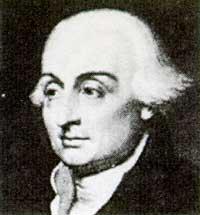Lagrange, Joseph Louis
(1736-1813)
Mathematician born in 1736 in a family of French origin of Turin. Joseph was the youngest of eleven children and the only one who came to maturity. Being young, he read the mathematical studies written by Halley and was fascinated. At the age of 18 years of his decision to follow that path, Turin began teaching geometry at the School of Artillery. In 1758 Lagrange created a scientific discussion group in Turin. This group of friends was the fringe of the Turin Academy of Sciences, founded in 1783, which was later also known as Miscellanea Tourinensia.

The arrival of Lagrange to mathematics was highlighted as young. He made numerous applications for calculating variations and was responsible for the general formulation. These works had great repercussions throughout Europe. From Germany he received Euler's invitation to attend. Lagrange renounced this option, but Euler left the direction of the Berlin Academy of Sciences in 1776 and until 1787 Lagrange devoted himself to it.
These years were dedicated to the analytical formulation of variation calculations. In 1788 he settled in Paris and that same year saw light Mècanique analytique. In it he skillfully collected his studies, his methodology of work and the main mechanical tests carried out since the time of Newton. He received the Paris Academy of Sciences awards in 1764, 1772 and 1774 for his contribution to this collection.
He also became interested in astronomy and tried to complete Newton's gravitational law. Lagrange believes that the gravitational model defined by Newton was limited to analyzing the forces between two isolated bodies in the universe. This did not take into account the forces that the rest of bodies generate among themselves. He solved this lack and studied with the help of Laplace the area of contribution that is generated between the Earth, the Moon and the Sun.
In 1973, Lagrange was appointed president of the commission of investigation of the new system of units. The result of numerous working meetings was the decimal metric system currently in force.
Still about to die, Napoleon wanted to pay tribute to the work done during his career. Despite not having much affection for the Revolution, Napoleon declared that the Revolution had a great debt to Lagran by granting it the title of count.
Herio travelled to Paris in search of Lagrange on April 0, 1813.
Buletina
Bidali zure helbide elektronikoa eta jaso asteroko buletina zure sarrera-ontzian











